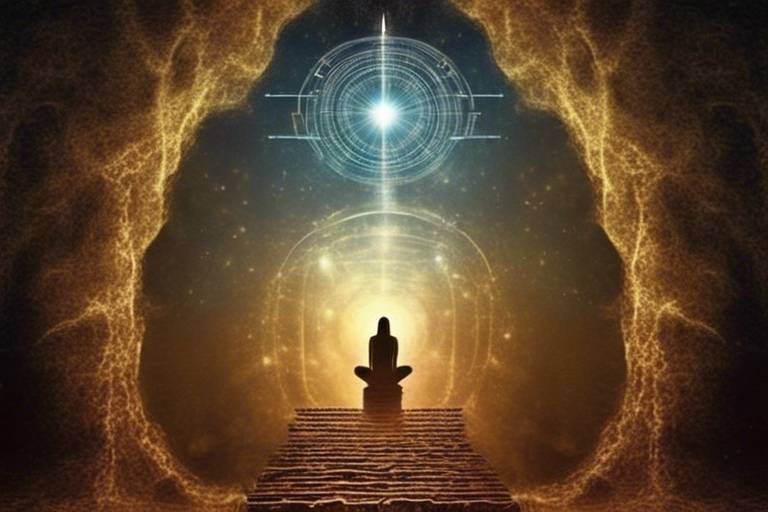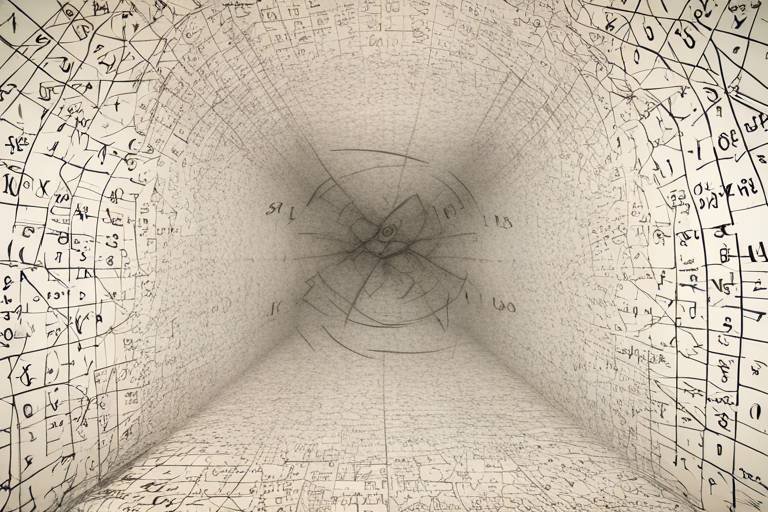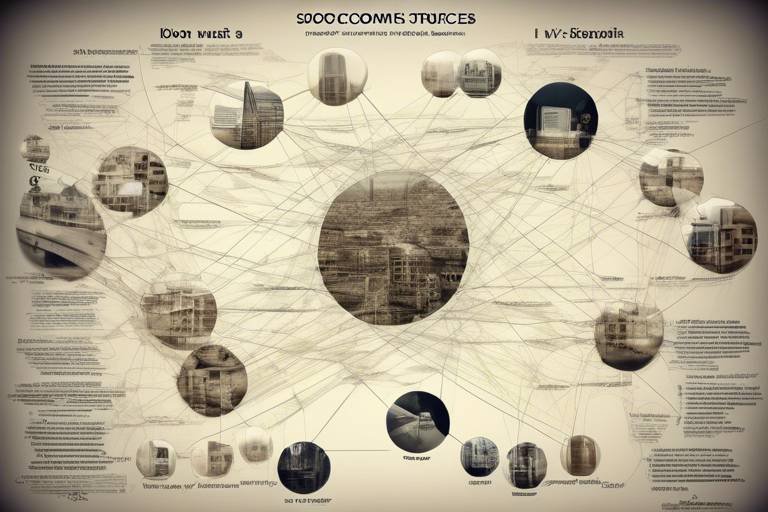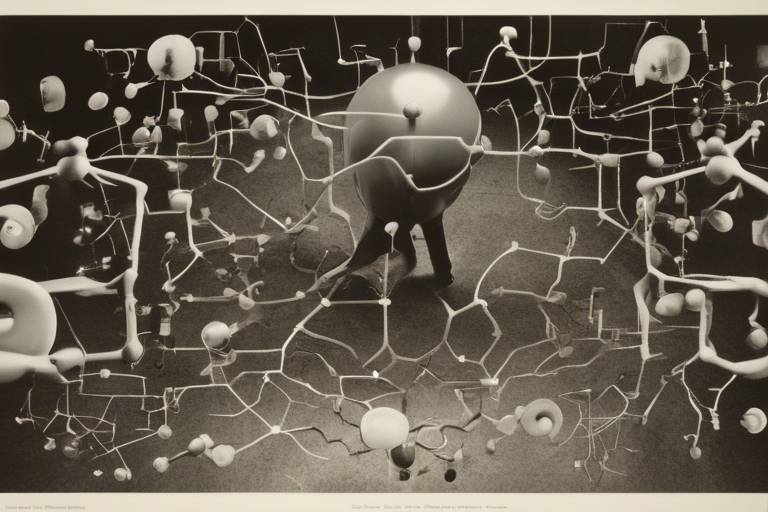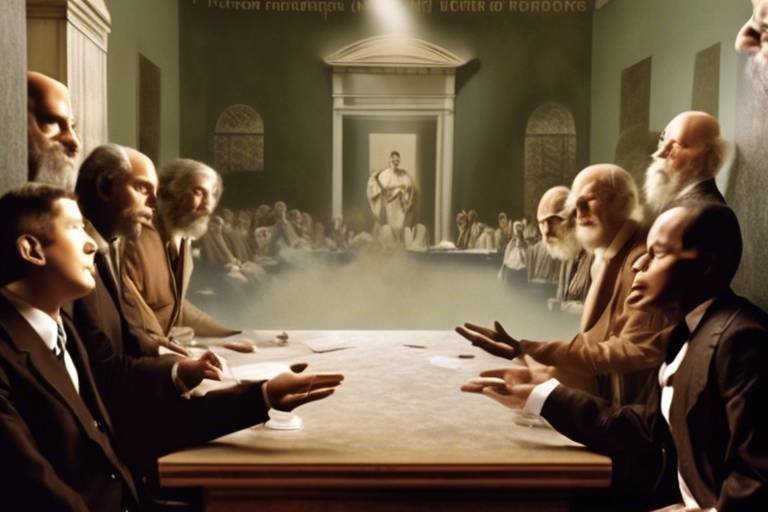Metaphysics - The Gateway to Mystical Experiences
Metaphysics is not just a branch of philosophy; it's a profound exploration of the very fabric of reality. Imagine stepping into a realm where the boundaries of existence blur, and the mysteries of the universe unfold before your eyes. It's like peeling back the layers of an onion, revealing deeper truths with every layer you shed. This article will guide you through the intricate web of metaphysical concepts, shedding light on their significance and the mystical experiences they can unveil.
At its core, metaphysics seeks to answer some of the most fundamental questions: What is the nature of reality? What does it mean to exist? These questions are not merely academic; they resonate with our daily lives and shape our understanding of the world. Just think about it—how often do we ponder the reasons behind our existence or the essence of the universe? Metaphysics invites us to embark on a journey of discovery, where we can explore the interplay between our perceptions and the reality that surrounds us.
As we delve into the world of metaphysics, we'll encounter various philosophical perspectives that have emerged over centuries. Each thinker adds a unique brushstroke to the canvas of metaphysical thought, creating a rich tapestry of ideas that continue to influence our understanding of existence. From ancient sages to modern philosophers, the quest for knowledge and truth remains a timeless endeavor.
But why should we care about metaphysics? Well, consider this: our beliefs about reality shape our experiences and interactions with the world. Metaphysical inquiries can lead us to profound insights that enhance our understanding of ourselves and the universe. It's like having a key to a locked door, revealing a room filled with wonder and wisdom. So, buckle up as we explore the intricate dance between metaphysics and mystical experiences, uncovering the secrets that lie within.
Understanding reality is fundamental in metaphysics. This section delves into different philosophical perspectives that define what constitutes reality and how our perceptions shape our understanding of the world around us.
Metaphysics is rooted in various philosophical traditions. This section outlines key thinkers and their contributions, highlighting how their ideas have shaped metaphysical thought and influenced mystical experiences throughout history.
Exploring ancient philosophies, such as those of Plato and Aristotle, provides insight into early metaphysical concepts. This section discusses their views on existence, the essence of being, and the pursuit of knowledge.
Plato's Theory of Forms posits that non-material abstract forms represent the most accurate reality. This section examines how this theory relates to metaphysical inquiry and mystical experiences.
Aristotle's Substance Theory offers a different approach, focusing on tangible substances and their properties. This section analyzes how Aristotle's ideas contribute to our understanding of metaphysics and reality.
Modern metaphysical thought has evolved significantly. This section highlights contemporary philosophers and their approaches to metaphysics, including discussions on consciousness, existence, and the nature of the universe.
Mystical experiences often intersect with metaphysical concepts. This section explores how metaphysical beliefs can enhance or influence mystical experiences, providing a deeper understanding of the connection between the two.
Altered states of consciousness are frequently associated with mystical experiences. This section investigates how these states can be induced and their metaphysical implications on our understanding of reality.
Intuition plays a significant role in metaphysical exploration. This section discusses how intuitive insights can lead to profound mystical experiences, offering a unique perspective on the nature of existence and reality.
- What is metaphysics? Metaphysics is a branch of philosophy that explores the fundamental nature of reality, existence, and the universe.
- How does metaphysics relate to mystical experiences? Metaphysical beliefs can enhance and influence mystical experiences, providing deeper insights into the nature of existence.
- Who are some key figures in metaphysical thought? Key figures include ancient philosophers like Plato and Aristotle, as well as contemporary thinkers who explore consciousness and existence.
- Can metaphysical inquiries lead to personal transformation? Yes, engaging with metaphysical concepts can lead to profound personal insights and transformations in understanding reality.

The Nature of Reality
Understanding reality is fundamental in metaphysics. It’s like peeling an onion; each layer reveals more complexity beneath the surface. But what exactly is reality? Is it merely what we perceive with our senses, or is there something deeper lurking beneath? Philosophers have been grappling with these questions for centuries, and their insights can help us navigate the intricate web of existence.
At its core, reality can be seen through various philosophical lenses. For instance, some argue that reality is a construct of our perceptions, while others believe it exists independently of our experiences. This divergence leads us to the concept of ontological perspectives, which explore the nature of being and existence. To illustrate this, let’s consider a few key viewpoints:
| Philosophical Perspective | Key Idea |
|---|---|
| Idealism | Reality is mentally constructed or immaterial. |
| Realism | Reality exists independently of our perceptions. |
| Phenomenalism | Reality is only what can be perceived. |
Each of these perspectives offers a unique lens through which to view reality. For instance, if you lean towards idealism, you might believe that our thoughts and perceptions shape the very fabric of reality. On the other hand, if you're a realist, you may argue that there’s an objective reality out there waiting to be discovered, regardless of our perceptions. This debate is not just academic; it has profound implications for how we live our lives and interact with the world.
Moreover, our perceptions are influenced by a myriad of factors, including culture, personal experiences, and even emotional states. Think about it: two people can witness the same event but interpret it entirely differently. This brings us to the concept of subjective reality versus objective reality. Subjective reality is shaped by individual experiences, while objective reality is the external world that exists regardless of individual perception.
To further illustrate this point, consider the following scenario: Imagine you and a friend are watching a sunset. You might see it as a breathtaking display of colors and feel a sense of peace, while your friend might view it as ordinary and unremarkable. Both of you are experiencing the same event, yet your interpretations differ vastly. This is the essence of how our perceptions shape our understanding of reality.
As we dive deeper into metaphysics, we find that reality isn't just a static concept; it's dynamic and ever-evolving. Our understanding of existence can change based on new insights, experiences, and knowledge. This fluidity challenges us to remain open-minded and curious about the world around us. After all, the quest for understanding reality is akin to embarking on a grand adventure—one that promises not only knowledge but also a profound sense of wonder.
In conclusion, the nature of reality is a complex interplay between perception and existence. It invites us to question our beliefs and explore the depths of our understanding. As we continue to ponder these profound questions, we may find that the journey itself is as enlightening as the answers we seek.
- What is metaphysics? Metaphysics is a branch of philosophy that explores the fundamental nature of reality, existence, and the relationship between mind and matter.
- How does perception affect our understanding of reality? Perception shapes our understanding of reality by filtering our experiences through personal biases, cultural influences, and emotional states.
- Can reality exist independently of our perceptions? This is a central debate in philosophy, with some arguing that reality is objective and exists independently, while others believe it is subjective and constructed by our perceptions.

Philosophical Foundations
Metaphysics, at its core, is a fascinating tapestry woven from various philosophical traditions that have sought to unravel the mysteries of existence and reality. The roots of metaphysical thought can be traced back to ancient times, where the likes of Plato and Aristotle laid the groundwork for centuries of philosophical inquiry. Their ideas not only shaped metaphysical discourse but also influenced countless mystical experiences reported throughout history. By examining these foundational philosophies, we can gain a clearer understanding of how metaphysics has evolved and continues to impact our perception of reality.
One of the most significant contributions to metaphysical thought comes from the ancient Greek philosophers. They asked profound questions like: What is the nature of existence? What does it mean to be? These inquiries are not just academic; they resonate deeply with our everyday experiences. For instance, Plato's and Aristotle's differing views on reality serve as a springboard for understanding how we perceive the world around us. While Plato emphasized the existence of abstract forms, Aristotle focused on tangible substances, each offering a unique lens through which we can explore metaphysical concepts.
To better illustrate the philosophical foundations of metaphysics, let's take a look at some key thinkers and their contributions:
| Philosopher | Key Contribution | Impact on Metaphysics |
|---|---|---|
| Plato | Theory of Forms | Introduced the idea of non-material abstract forms as the truest reality. |
| Aristotle | Substance Theory | Focused on tangible substances and their properties as the basis of reality. |
| Descartes | Cogito, ergo sum | Established a foundation for modern philosophy through skepticism and reason. |
| Kant | Transcendental Idealism | Proposed that our understanding of reality is shaped by our perceptions. |
As we move forward in time, the philosophical foundations of metaphysics have continued to evolve. The transition from ancient to modern thought brought about new questions and perspectives. Thinkers like René Descartes and Immanuel Kant introduced concepts that challenged previous notions of reality and existence. Descartes’ famous assertion, "Cogito, ergo sum" (I think, therefore I am), emphasized the role of consciousness in understanding existence, while Kant’s transcendental idealism argued that our perceptions fundamentally shape our experience of reality.
In essence, the philosophical foundations of metaphysics are not merely historical artifacts; they are living ideas that continue to influence our understanding of existence today. By exploring these foundational philosophies, we open ourselves up to a richer, more nuanced perspective on the nature of reality and our place within it. The interplay between these ideas and mystical experiences can lead us to profound insights, making metaphysics a vital area of exploration for anyone seeking to understand the deeper aspects of existence.
- What is metaphysics? Metaphysics is a branch of philosophy that explores the fundamental nature of reality, existence, and the relationship between mind and matter.
- Who are some key figures in metaphysical thought? Key figures include Plato, Aristotle, Descartes, and Kant, each contributing unique perspectives on reality and existence.
- How does metaphysics relate to mystical experiences? Metaphysics often provides a framework for understanding mystical experiences, as both explore the nature of reality and existence.

Ancient Philosophies
When we delve into the realm of ancient philosophies, we uncover a treasure trove of ideas that have shaped our understanding of metaphysics and existence. The thoughts of philosophers like Plato and Aristotle serve as foundational pillars in this exploration. Their inquiries into the essence of being and the nature of reality continue to resonate, inviting us to ponder profound questions that echo through the ages.
Plato's philosophical journey begins with his famous Theory of Forms, which asserts that the material world is merely a shadow of a higher reality. Imagine walking through a gallery of shadows, where the true essence of beauty, justice, and goodness exists beyond our tangible experience. Plato believed that these non-material forms are the most accurate representations of reality, suggesting that our physical world is but a reflection of these ideal forms. This notion not only challenges our perception of reality but also opens the door to mystical experiences, as it invites us to seek a deeper understanding of existence beyond what we can see and touch.
On the other hand, we have Aristotle, who took a more grounded approach with his Substance Theory. He argued that reality is composed of tangible substances that possess distinct properties. Aristotle’s perspective is akin to examining the building blocks of existence, where each substance has a purpose and a role in the grand tapestry of life. This idea encourages us to explore the material world and appreciate the intricate relationships between objects and their attributes. Aristotle's emphasis on empirical observation and logical reasoning laid the groundwork for scientific inquiry, yet it also complements metaphysical thought by urging us to consider the underlying principles that govern our reality.
Both philosophers, despite their differing views, contribute significantly to our understanding of metaphysics. Their ideas invite us to engage in a dialogue with ourselves about the nature of existence. Are we merely observers of a physical world, or are we participants in a grand metaphysical narrative? As we reflect on their teachings, we might find ourselves questioning the very fabric of our reality.
In summary, ancient philosophies offer us a rich landscape to explore metaphysical concepts. The contrasting yet complementary ideas of Plato and Aristotle provide a framework for understanding the complexities of existence. As we journey through their thoughts, we are reminded that the quest for knowledge is not merely an academic exercise but a deeply personal exploration that can lead to mystical experiences and profound insights about our place in the universe.
- What is metaphysics? Metaphysics is a branch of philosophy that explores the fundamental nature of reality, existence, and the relationships between objects and their properties.
- How do ancient philosophies influence modern metaphysics? Ancient philosophies provide foundational concepts that shape contemporary metaphysical thought, allowing for a deeper understanding of existence and reality.
- What are mystical experiences? Mystical experiences are profound, often transformative moments that can provide insight into the nature of reality and existence, frequently linked to metaphysical beliefs.

Plato's Theory of Forms
Plato's Theory of Forms is a cornerstone of his philosophical thought, offering a profound perspective on the nature of reality. According to Plato, the physical world we perceive through our senses is merely a shadow of a higher, unchanging reality composed of abstract forms or ideas. These forms are not just mere concepts; they are the most accurate representations of reality, existing in a realm that transcends our everyday experiences. Imagine walking through a gallery filled with paintings. Each painting represents a unique interpretation of a particular subject, but the subject itself—the essence of what it is—exists beyond any single representation. This is akin to Plato's forms, which embody the true essence of things.
Plato posited that these forms are eternal and immutable, unlike the material objects we encounter, which are subject to change and decay. For instance, consider the concept of beauty. While we may see beautiful things in the world, such as a sunset or a piece of art, these are mere reflections of the true form of Beauty itself, which exists independently of any particular instance. This notion leads us to ponder: if the physical world is a mere reflection, what does that say about our understanding of reality? Are we merely observing shadows on the wall, as Plato famously illustrated in his Allegory of the Cave?
This allegory serves as a powerful metaphor for human perception and enlightenment. In the cave, prisoners are chained and can only see shadows cast on a wall, mistaking them for reality. When one prisoner escapes and discovers the outside world, he realizes the shadows are not the true forms of objects, but mere reflections of them. This journey from darkness to light symbolizes the philosopher's quest for knowledge and understanding of the forms. It's a reminder that our perceptions can often be limited and that true knowledge requires a deeper exploration beyond what is immediately visible.
In terms of mystical experiences, Plato's Theory of Forms suggests that such experiences may offer glimpses into this higher reality. When individuals encounter profound moments of insight or unity, it could be interpreted as an encounter with the forms themselves. These moments challenge our conventional understanding of existence, urging us to consider the possibility that there is more to reality than meets the eye. The connection between metaphysics and mystical experiences becomes evident as we explore how our understanding of forms can lead to transformative insights.
To further illustrate Plato's ideas, consider the following table that summarizes key aspects of the Theory of Forms:
| Aspect | Description |
|---|---|
| Forms | Abstract, non-material ideals that represent the true essence of objects. |
| Physical World | A mere shadow or reflection of the higher reality of forms. |
| Allegory of the Cave | A metaphor illustrating the difference between perception and reality. |
| Mystical Insights | Moments of understanding that may connect us to the realm of forms. |
In conclusion, Plato's Theory of Forms invites us to question the nature of reality and our place within it. It offers a framework for understanding the deeper truths that lie beyond our sensory experiences. By contemplating these forms, we not only enrich our philosophical inquiries but also open the door to mystical experiences that can profoundly alter our perceptions of existence.

Aristotle's Substance Theory
Aristotle's Substance Theory is a cornerstone of his metaphysical philosophy, offering a pragmatic approach to understanding the essence of reality. Unlike his mentor Plato, who emphasized abstract forms, Aristotle focused on the tangible, concrete world around us. He argued that substances are the fundamental entities of reality, and everything else—qualities, relations, and even thoughts—are secondary to these substances. To Aristotle, a substance is not just a physical object; it is a combination of matter and form. This duality forms the basis of his metaphysical inquiry, suggesting that every substance has an underlying essence that defines its nature.
In Aristotle's view, substances are categorized into two main types: primary substances and secondary substances. Primary substances are individual entities, like a specific tree or a particular person, while secondary substances refer to the species or genera to which these entities belong. For instance, the individual oak tree is a primary substance, whereas 'tree' as a concept is a secondary substance. This distinction is crucial because it highlights how individual entities can embody universal qualities, bridging the gap between the particular and the general.
Aristotle also introduced the concept of hylomorphism, which posits that every substance is a composite of matter (the physical aspect) and form (the essence or nature). Matter provides the potentiality for a substance, while form actualizes this potentiality, giving it its specific characteristics. This relationship is akin to a sculptor chiseling away at a block of marble; the marble holds the potential for a beautiful statue, but it is only through the sculptor's skill that this potential is realized. This analogy illustrates how Aristotle viewed the relationship between matter and form as dynamic and interdependent.
Furthermore, Aristotle's Substance Theory has profound implications for our understanding of change and permanence in the world. He proposed that while substances can undergo change, their essence remains constant. For example, a tree may lose its leaves in autumn, but it remains fundamentally a tree. This idea introduces the concept of substantial change versus accidental change. Substantial change occurs when a substance transforms into a different kind of substance, while accidental change refers to changes that do not affect the underlying essence. This framework allows us to comprehend how entities can evolve and adapt while still maintaining their core identity.
In the context of metaphysical inquiry, Aristotle's Substance Theory encourages us to explore the nature of existence more deeply. It invites us to ask questions like: What does it mean to be? What constitutes the essence of an object? By engaging with these questions, we can uncover the layers of meaning that define our reality. Aristotle's insights continue to resonate in contemporary philosophical discussions, influencing fields such as ontology, epistemology, and even modern science.
In summary, Aristotle's Substance Theory provides a robust framework for understanding the nature of reality. By emphasizing the importance of substances and their essences, Aristotle invites us to look beyond mere appearances and explore the deeper truths that underpin our existence. This exploration not only enriches our understanding of the world but also opens the door to mystical experiences that arise when we connect with the essence of being itself.
- What is Aristotle's Substance Theory?
Aristotle's Substance Theory posits that substances are the fundamental entities of reality, consisting of both matter and form. It emphasizes the importance of understanding the essence of these substances.
- How does Aristotle differentiate between primary and secondary substances?
Primary substances are individual entities (e.g., a specific tree), while secondary substances refer to the categories or species to which these entities belong (e.g., 'tree' as a concept).
- What is hylomorphism?
Hylomorphism is the idea that every substance is a combination of matter (the physical aspect) and form (the essence), which together define the nature of the substance.
- What are substantial and accidental changes?
Substantial change occurs when a substance transforms into a different kind of substance, while accidental change refers to changes that do not affect the underlying essence of the substance.

Modern Metaphysical Thought
In the ever-evolving landscape of philosophy, has emerged as a vibrant tapestry woven from diverse ideas and perspectives. Unlike the rigid structures of ancient philosophies, contemporary metaphysics embraces a fluidity that reflects our complex understanding of existence and consciousness. Thinkers today are not just revisiting the questions posed by giants like Plato and Aristotle; they are diving deep into the realms of science, psychology, and even quantum physics to explore the very fabric of reality.
One of the most intriguing aspects of modern metaphysics is its focus on consciousness. Philosophers such as David Chalmers have sparked significant discussions about the "hard problem of consciousness," which questions how subjective experiences arise from physical processes. This line of inquiry not only challenges traditional metaphysical boundaries but also invites us to reconsider what it means to be 'alive' and 'aware.' Are we merely biological machines, or is there something more profound at play?
Furthermore, the intersection of metaphysics and quantum mechanics has opened new avenues for exploration. The idea that particles can exist in multiple states until observed has led some to propose that consciousness itself may play a role in shaping reality. This notion resonates with ancient metaphysical concepts of interconnectedness and unity, suggesting that our thoughts and perceptions might actually influence the universe in ways we are just beginning to understand.
Another fascinating area of modern metaphysical thought is the exploration of existentialism and phenomenology. Philosophers like Jean-Paul Sartre and Maurice Merleau-Ponty have emphasized the importance of personal experience and perception in understanding existence. They argue that reality is not a fixed entity but rather a dynamic interplay of experiences shaped by individual perspectives. This approach encourages a more personal engagement with metaphysical questions, allowing for a richer, more nuanced understanding of our place in the cosmos.
To illustrate the diversity within modern metaphysical thought, consider the following table that highlights key contemporary philosophers and their contributions:
| Philosopher | Key Contribution |
|---|---|
| David Chalmers | Hard Problem of Consciousness |
| Alfred North Whitehead | Process Philosophy |
| Daniel Dennett | Consciousness as an Evolved Trait |
| Gilles Deleuze | Multiplicity and Difference |
As we navigate through these modern metaphysical inquiries, it becomes evident that the quest for understanding reality is not merely an academic pursuit but a deeply personal journey. Each philosopher contributes a unique lens through which we can examine our existence, prompting us to ask questions like: What is the nature of reality?, How do our perceptions shape our understanding of the universe?, and Is there a deeper connection between consciousness and the cosmos?
In conclusion, modern metaphysical thought serves as a bridge between ancient wisdom and contemporary understanding. It invites us to explore the mysteries of existence with an open mind, urging us to seek answers not only in the external world but within ourselves. As we continue to ponder these profound questions, we may just find that the journey itself is as enlightening as the answers we seek.
- What is metaphysics? Metaphysics is a branch of philosophy that explores the fundamental nature of reality, existence, and the relationships between mind and matter.
- How does modern metaphysics differ from ancient metaphysics? Modern metaphysics incorporates scientific discoveries and contemporary philosophical thought, allowing for a more dynamic understanding of reality compared to the more rigid frameworks of ancient philosophies.
- Can metaphysical beliefs influence our experiences? Yes, many believe that metaphysical beliefs can shape our perceptions and experiences, potentially enhancing mystical experiences and our understanding of existence.

Mystical Experiences and Metaphysics
Mystical experiences are often seen as the bridge between the mundane and the divine, a realm where the ordinary rules of reality seem to dissolve. These experiences can be deeply transformative, leading individuals to profound insights about existence, purpose, and the universe itself. In the context of metaphysics, these experiences take on a new light, as they allow us to explore the very fabric of reality and our place within it. But what exactly connects metaphysics to these mystical moments? To put it simply, metaphysical beliefs can significantly shape our understanding and interpretation of these extraordinary experiences. They provide a framework through which we can analyze and make sense of what might otherwise feel chaotic or incomprehensible.
One of the most fascinating aspects of mystical experiences is their ability to transcend ordinary perception. Individuals often report sensations of unity with the universe, feelings of timelessness, or encounters with what they perceive as a higher power. These experiences are not just random occurrences; they are often deeply rooted in the metaphysical beliefs of the individual. For instance, someone who holds a dualistic view of reality may interpret their experience as a connection to a spiritual realm, while a materialist may struggle to find meaning in the same event. This divergence highlights the importance of metaphysical frameworks in shaping our understanding of mystical experiences.
Moreover, altered states of consciousness play a crucial role in facilitating mystical experiences. These states can be induced through various means, such as meditation, deep contemplation, or even psychedelic substances. When individuals enter these altered states, they often report a sense of expanded awareness, where the boundaries of self and other begin to blur. This phenomenon raises intriguing questions about the nature of consciousness itself. Is consciousness a product of the brain, or is it something more transcendent? Metaphysics seeks to answer these questions, offering insights into the underlying nature of reality.
Intuition also holds a significant place in the exploration of metaphysics and mystical experiences. Many individuals describe their mystical encounters as moments of deep intuition or insight, where they suddenly grasp truths that were previously obscured. This intuitive understanding can feel like a flash of enlightenment, illuminating the complexities of existence in an instant. It is as if metaphysical inquiry opens a door to deeper layers of reality, allowing individuals to perceive connections and meanings that were once hidden. In this way, intuition serves as a guiding light in the often murky waters of metaphysical exploration.
In conclusion, the relationship between mystical experiences and metaphysics is a rich and complex one. These experiences not only challenge our conventional understanding of reality but also invite us to reconsider our metaphysical beliefs. By examining how our perceptions shape our experiences, we can gain a deeper appreciation for the mysteries of existence. As we delve into the realms of metaphysics, we open ourselves up to the possibility of profound transformation, where the lines between the known and the unknown begin to blur, revealing the infinite possibilities that lie ahead.
- What are mystical experiences? Mystical experiences are profound moments where individuals feel a deep connection to the universe or a higher power, often accompanied by feelings of unity, peace, and enlightenment.
- How does metaphysics relate to mystical experiences? Metaphysics provides a framework for understanding the nature of reality, which can shape how individuals interpret their mystical experiences.
- Can altered states of consciousness enhance mystical experiences? Yes, altered states of consciousness, induced through meditation or other means, can facilitate deeper mystical experiences by expanding awareness and perception.
- What role does intuition play in metaphysical exploration? Intuition often leads individuals to insights and understandings that transcend rational thought, allowing for a deeper exploration of metaphysical concepts.

Altered States of Consciousness
When we think about , we often envision a journey into the unknown, a mystical exploration that transcends our everyday experiences. These states can be induced through various means, such as meditation, deep relaxation, or even the use of psychoactive substances. The fascinating aspect of these altered states is not just their ability to shift our perception but also how they can unveil profound insights into the nature of reality itself. Have you ever wondered what lies beyond the veil of ordinary consciousness? What secrets might be waiting for us in the depths of our minds?
Throughout history, cultures around the world have recognized the significance of altered states, often associating them with spiritual awakening or mystical experiences. For instance, indigenous tribes have long utilized ritualistic practices to enter these states, seeking guidance from the spirit world. Similarly, modern psychology has explored these phenomena, revealing their potential to expand our understanding of consciousness and existence.
To better grasp the concept, let’s explore some common methods used to induce altered states of consciousness:
- Meditation: A practice that encourages deep focus and mindfulness, allowing individuals to transcend ordinary thought patterns.
- Breathwork: Techniques that manipulate the breath to alter consciousness, often leading to profound emotional release and insight.
- Psychedelic Substances: Compounds like psilocybin or LSD that can dramatically alter perception, often leading to mystical experiences or a sense of interconnectedness.
These methods can lead to experiences that challenge our conventional understanding of reality. For example, during a deep meditative state, individuals often report feelings of unity with the universe, a sensation that can be both exhilarating and humbling. This sense of oneness can spark a profound realization that we are all interconnected, blurring the lines between self and the cosmos.
Moreover, altered states can have significant implications for our metaphysical inquiries. They invite us to question the very fabric of our existence. Are we merely biological beings, or is there a deeper essence that connects us to the universe? These experiences can act as gateways, allowing us to explore the profound mysteries of life and existence. They challenge the notion that reality is solely what we can perceive with our senses, pushing us to consider the unseen dimensions of our world.
In conclusion, altered states of consciousness serve as a powerful reminder that our understanding of reality is far from complete. They beckon us to embark on a journey of exploration and discovery, revealing the rich tapestry of existence that lies just beyond our everyday awareness. So, the next time you find yourself in a moment of stillness, consider diving deeper into your consciousness. What might you uncover?
- What are altered states of consciousness? Altered states of consciousness refer to mental states that differ significantly from the normal waking state, often characterized by changes in perception, emotion, and thought processes.
- How can I induce an altered state? You can induce altered states through various methods such as meditation, deep breathing exercises, and certain psychoactive substances, but it's essential to approach these practices with caution and respect.
- What is the significance of these states in metaphysics? Altered states can provide insights into the nature of reality and existence, often leading to mystical experiences that challenge our conventional understanding of the universe.

The Role of Intuition
Intuition is often described as a gut feeling or an instinctive understanding of something without the need for conscious reasoning. In the realm of metaphysics, intuition serves as a powerful tool that can lead to profound insights about existence and reality. Have you ever had that moment when a sudden realization struck you, seemingly out of nowhere? That’s intuition at work! It’s as if your mind is tapping into a deeper layer of understanding, one that transcends the ordinary limits of rational thought.
In metaphysical exploration, intuition can act as a bridge connecting us to the unseen dimensions of our reality. It allows us to perceive truths that may not be immediately evident through logic or empirical evidence. This is particularly significant when we consider the nature of existence and consciousness. Intuitive insights can often feel like whispers from a deeper part of ourselves, guiding us toward a greater understanding of the universe.
Moreover, many mystics and philosophers throughout history have emphasized the importance of intuition in their journeys. For instance, the renowned philosopher Immanuel Kant suggested that our experiences are shaped by both sensory input and innate intuitions. This duality implies that while we gather knowledge through observation, our intuitive faculties help us synthesize and make sense of that knowledge in a more profound way.
Intuition can also enhance mystical experiences, providing a unique lens through which we can view our interactions with the cosmos. When individuals enter altered states of consciousness—whether through meditation, deep contemplation, or even spontaneous moments of clarity—they often report feelings of interconnectedness and unity with the universe. This is where intuition shines, as it can guide individuals to interpret these experiences in a meaningful way, leading to personal revelations and transformations.
To illustrate the role of intuition in metaphysical thought, consider the following aspects:
- Spontaneous Insights: Many people describe moments of clarity that come without warning, offering profound insights into their lives or the nature of reality.
- Creative Problem Solving: Intuition often plays a role in creative processes, allowing individuals to connect disparate ideas and find innovative solutions.
- Inner Guidance: Intuition can serve as a compass, helping individuals navigate their spiritual journeys and make choices aligned with their true selves.
In summary, intuition is not just a fleeting feeling; it is a vital aspect of our metaphysical exploration. By tuning into our intuitive senses, we can uncover layers of understanding that enrich our experiences and deepen our connection to the universe. So the next time you feel that inexplicable nudge or insight, embrace it! It might just be the universe whispering its secrets to you.
- What is intuition? Intuition is the ability to understand something instinctively, without the need for conscious reasoning.
- How does intuition relate to metaphysics? Intuition helps individuals perceive deeper truths about existence and reality, often guiding them in their metaphysical inquiries.
- Can everyone develop their intuition? Yes, intuition can be cultivated through practices like meditation, mindfulness, and self-reflection.
- What are some common ways to enhance intuition? Engaging in creative activities, spending time in nature, and practicing mindfulness can all help enhance intuitive abilities.
Frequently Asked Questions
-
What is metaphysics?
Metaphysics is a branch of philosophy that explores the fundamental nature of reality, existence, and the universe. It delves into questions like "What is being?" and "What is the nature of objects and their properties?" Essentially, it seeks to understand what lies beyond the physical world.
-
How does metaphysics relate to mystical experiences?
Metaphysics often intersects with mystical experiences by providing a framework for understanding the nature of consciousness and existence. Many mystical experiences can lead to insights about the universe and our place within it, which are deeply rooted in metaphysical concepts.
-
What are some key philosophical foundations of metaphysics?
Key philosophical foundations of metaphysics include the ideas of ancient thinkers like Plato and Aristotle. Plato's Theory of Forms suggests that non-material abstract forms represent the most accurate reality, while Aristotle's Substance Theory focuses on tangible substances and their properties. Both have significantly shaped metaphysical thought.
-
How do altered states of consciousness relate to metaphysics?
Altered states of consciousness, such as those induced by meditation or psychedelics, can lead to profound mystical experiences. These states often challenge our perceptions of reality and can provide insights into metaphysical questions about existence and the nature of the universe.
-
Can intuition enhance our understanding of metaphysics?
Absolutely! Intuition can play a crucial role in metaphysical exploration. Many individuals report that intuitive insights lead them to profound realizations about existence and reality, often providing a unique perspective that transcends rational thought.
-
What are the modern approaches to metaphysical thought?
Modern metaphysical thought has evolved to include discussions on consciousness, existence, and the nature of the universe. Contemporary philosophers explore how our understanding of reality has changed with advancements in science and psychology, often integrating these insights into metaphysical inquiry.

